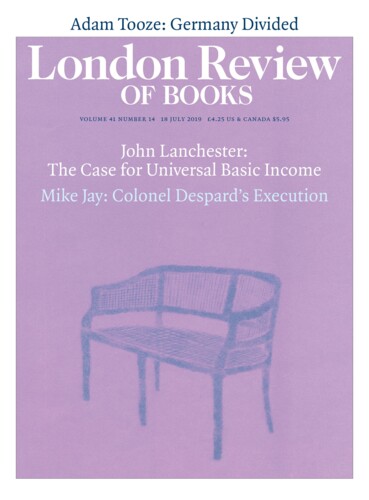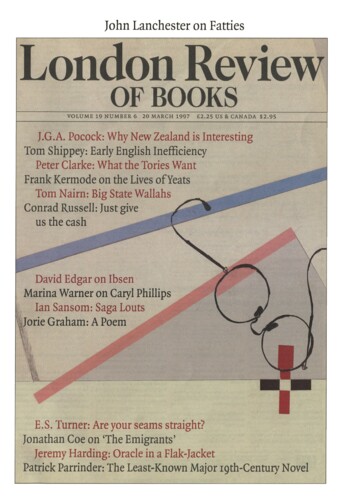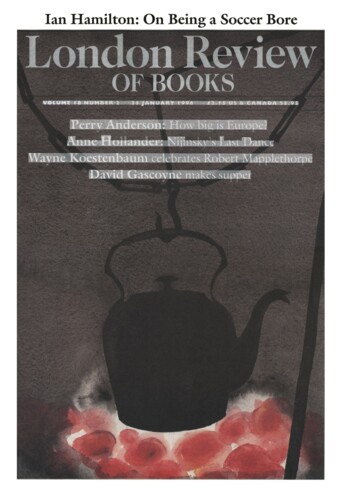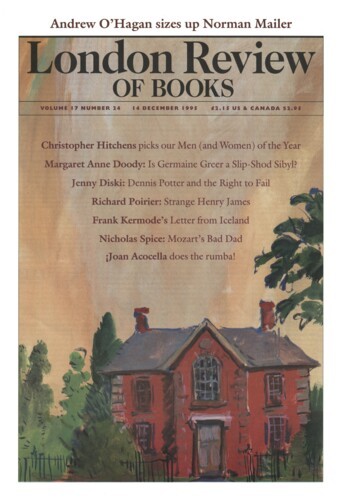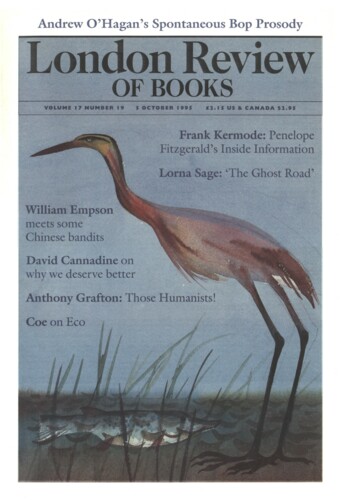Patrick Parrinder
Patrick Parrinder is a reader in English at the University of Reading. His books include Authors and Authority and Science Fiction: Its Criticism and Teaching. A study of James Joyce has recently appeared.
To arms!
Patrick Parrinder, 20 March 1997
Is every fictional character a kind of doll? Thackeray presented his characters as puppets, which he took out of the box at the beginning of the novel, and shut away again at the end. E.M. Forster spoke of round and flat characters, as if they were two types of doll; the flat ones could be made lifelike by shaking them vigorously. The gulf between childhood toys and adult reading is bridged by fantasy tales such as Pinocchio, where the puppet comes to life, and Hoffmann’s ‘The Sand-Man’, in which the beautiful Olympia turns out to be a mechanical doll. Contemporary popular fiction swarms with robots, mannequins, genetically engineered androids and talking computers, not to mention human beings who behave in programmed and entirely predictable ways.
By an Unknown Writer
Patrick Parrinder, 25 January 1996
Italo Calvino was born in 1923 and came to prominence in post-war Italy as a writer of neo-realist and politically committed short stories, some of them published in the Communist paper L’Unità. A major social-problem novel set in contemporary Italy was naturally expected of him, but he found himself unable to write it. Instead, as he subsequently explained, he ‘conjured up’ the sort of books he himself would have liked to read – ‘the sort by an unknown writer, from another age and another country, discovered in an attic’. He began with stories strongly suggestive of traditional romance, and later published in a volume called Our Ancestors: ‘The Cloven Viscount’, in which both halves of the viscount chopped neatly in two by a Turkish cannon-ball return home separately to haunt one another, and the novel-length ‘Baron in the Trees’, where a 12-year-old aristocrat decides never again to set foot on the ground after a family row in which he refuses to eat up his plateful of snails. This fantasy of an 18th-century Tarzan is a form of modern pastoral, a highly sophisticated reminder of primitive and innocent reading experiences.’
Devil take the hindmost
14 December 1995
Mannequin-Maker
Patrick Parrinder, 5 October 1995
A winter evening in Istanbul in the late Seventies. Political murders, disappearances and torture are daily events, and a military coup seems to be in the offing. Galip, a young lawyer whose speciality is defending political prisoners, returns home to find that his wile Rüya has left him. His instinctive response is to pretend that nothing has happened – Rüya is simply too ill to leave the apartment or come to the telephone. He then begins to scour the city looking for her.
Pieces about Patrick Parrinder in the LRB
Devil take the hindmost
John Sutherland, 14 December 1995
Among other certain things (death, taxes etc) is the rule that no work of science fiction will ever win the Booker Prize – not even the joke 1890s version. H.G. Wells’s The Time...
Outside the Academy
Robert Alter, 13 February 1992
These two meticulous surveys of modern criticism in all its vertiginous variety lead one to ponder what it is all about and where it may be heading. The book by René Wellek, focused on...
Post-Humanism
Alex Zwerdling, 15 October 1987
When the history of late 20th-century literary culture comes to be written, the extraordinary vogue of metatheoretical works will surely require explanation. What can account for the obsessive...
Raiding Joyce
Denis Donoghue, 18 April 1985
Patience is a mark of the classic, according to Frank Kermode. ‘King Lear, underlying a thousand dispositions, subsists in change, prevails, by being patient of interpretation.’ It...
Read anywhere with the London Review of Books app, available now from the App Store for Apple devices, Google Play for Android devices and Amazon for your Kindle Fire.
Sign up to our newsletter
For highlights from the latest issue, our archive and the blog, as well as news, events and exclusive promotions.
